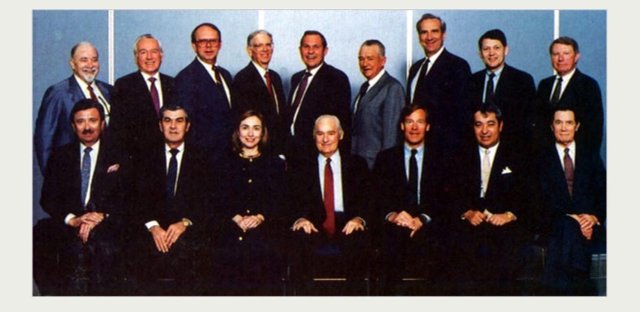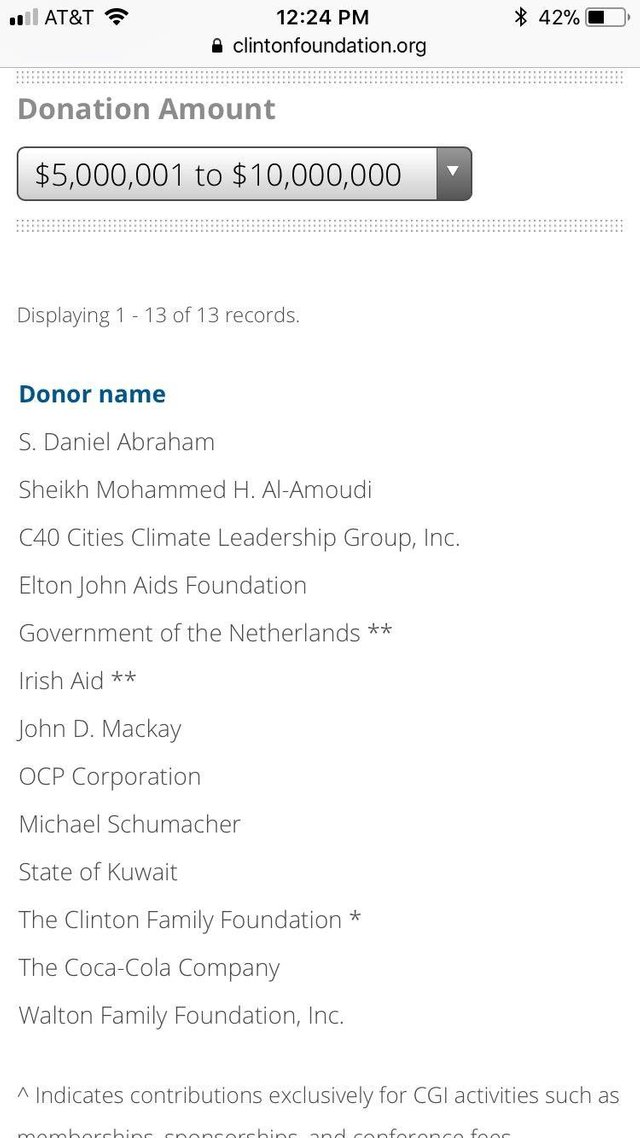Walmart and Hillary Clinton
In 1986, Sam Walton, the founder of Wal-Mart, was under pressure to appoint a woman to the company’s 15-member -all male- board of directors. So, Mr. Walton asked a young lawyer, Hillary Rodham Clinton, who just happened to be married to the governor of Arkansas at the time, where Wal-Mart is based, to be the sole female member of the board.
During six years (1986 -1992) as a member of the Wal-Mart board of directors, Hillary Clinton remained silent as the world’s largest retailer waged a major campaign against the labor unions seeking to represent store workers.
John Tate who was one of Clinton’s fellow board members, was leading Wal-Mart’s anti-union efforts. Tate was also Wal-Mart’s executive vice president and served on the board with Clinton for four of her six years. Tate favorite phrase was, as he admitted himself, “Labor unions are nothing but blood-sucking parasites living off the productive labor of people who work for a living.”
According to an ABC News report, published in 2008, Clinton appears in videotapes of the stockholder meetings where she never appears to defend the role of labor unions. On the contrary, the tapes show Clinton in the role of a loyal company woman. “I’m always proud of Wal-Mart and what we do and the way we do it better than anybody else,” she said at a June 1990 stockholders meeting.
Clinton also worked at the Law Firm which represented Walmart. A 1994 New York Times story identified Clinton as the Rose Law firm’s lead lawyer for the company.
Associated Press reported in 2006 that Mrs. Clinton was paid $18,000 annually plus $1,500 for each meeting she attended as a board member. The Clintons had $100,000 in Walmart stock, which was put into a blind trust after the 1992 election. The Clintons also flew for free on Wal-Mart corporate planes 14 times in 1990 and 1991, in preparation for Bill Clinton’s 1992 presidential bid.
The ties between the Clintons and the Walton family continue to this day. Alice Walton, the daughter of Wal-Mart’s founder Sam Walton, is a big supporter of Hillary Clinton becoming the Democratic presidential nominee in 2016. According to filings with the FEC, Alice Walton gave $25,000, the maximum allowed under federal law, to the super PAC Ready for Hillary. According to Clinton Foundation’s disclosures, the Walmart Foundation and the Walton Family Foundation each have given between $1 million and $5 million to the Clinton Foundation.
Attached documentary: The film exposes Wal-Mart’s unscrupulous business practices through interviews with former employees, small business owners, and footage of Walmart executives.

Link to show how much has been donated by the Walton Family to the Clinton Foundation https://www.clintonfoundation.org/contributors?category=%245%2C000%2C001+to+%2410%2C000%2C000

Original article sourced material by Emine Dilek
Original Article written in the USAtoday
Wal-Mart pits Clinton's ambition against her past
NEW YORK (AP) — With retail giant Wal-Mart under fire to improve its labor and health care policies, one Democrat with deep ties to the company — Sen. Hillary Rodham Clinton — has started feeling her share of the political heat.
Clinton served on Wal-Mart's board of directors for six years when her husband was governor of Arkansas. And the Rose Law Firm, where she was a partner, handled many of the Arkansas-based company's legal affairs.
By Joe Marquette, AP
Sen. Hillary Clinton
Hillary Clinton had kind words for Wal-Mart as recently as 2004, when she told an audience at the convention of the National Retail Federation that her time on the board "was a great experience in every respect."
But in recent months, as the company has become a target for Democratic activists, she has largely steered clear of any mention of Wal-Mart. And late last year, Clinton's re-election campaign returned a $5,000 contribution from Wal-Mart, citing "serious differences with current company practices."
As Clinton sheds her Arkansas past and looks ahead to a possible 2008 presidential run, the Wal-Mart issue presents an exquisite dilemma: how to reconcile the political demands she faces today with her history at a company many American consumers depend upon but many Democratic activists revile.
"The interesting question is not just Hillary Clinton's history at Wal-Mart, but why it's delicate for her to talk about Wal-Mart," said Charles Fishman, author of The Wal-Mart Effect, a book on the company's impact on the national economy. "Plenty of Democrats denounce Wal-Mart, but there are also plenty of people who need it, love it and rely on it."
In 1986, when Wal-Mart's founder, Sam Walton, tapped Clinton to be the company's first female board member, Wal-Mart was a fraction of its current size, with $11.9 billion in net sales.
Today, Wal-Mart is the world's largest retailer and largest private employer, with over $312 billion in sales last year and 1.3 million employees or "associates" in the U.S. alone. But recently, the company has drawn intense scrutiny for its labor practices — from its wages to the lack of affordable health coverage for employees, to its stiff resistance to unionization.
Throughout the 1980s, both Bill and Hillary Clinton nurtured relationships with Walton, a conservative Republican and by far Arkansas' most influential businessman.
Among other things, Hillary Clinton sought Walton's help in 1983 for Bill Clinton's so-called Blue Ribbon Commission on Education, a major effort to improve Arkansas' troubled public schools. The overhaul became a centerpiece of Clinton's governorship.
And Wal-Mart's Made in America campaign, which for years touted the company's sales of American products in its stores, was launched after Bill Clinton persuaded Walton to help save 200 jobs at an Arkansas shirt manufacturing plant. The Made in America campaign has virtually vanished in recent years, as the company's manufacturing has gradually moved overseas — another point of criticism by many anti-Wal-Mart activists.
The Clintons also benefited financially from Wal-Mart. Hillary Clinton was paid $18,000 each year she served on the board, plus $1,500 for each meeting she attended. By 1993 she had accumulated at least $100,000 in Wal-Mart stock, according to Bill Clinton's federal financial disclosure that year. The Clintons also flew for free on Wal-Mart corporate planes 14 times in 1990 and 1991 in preparation for Bill Clinton's 1992 presidential bid.
Wal-Mart has little to say about Hillary Clinton's board service, and will not release minutes of the company's board meetings during her tenure. Lorraine Voles, Clinton's communications director, turned down a request for an interview with the senator.
Still, details have come to light over the years.
Bob Ortega, author of In Sam We Trust, a history of Wal-Mart, said Clinton used her position to urge the company to improve its gender and racial diversity. Because of Clinton's prodding, Walton agreed to hire an outside firm to track the company's progress in hiring women and minorities, Ortega said.
"These were things the company was not addressing and wouldn't have, had she not pushed them to do so," Ortega said. "She's somebody who could definitely get things done."
In fact, Clinton proved to be such a thorn in Walton's side that at Wal-Mart's annual meeting in 1987, when shareholders challenged Walton on the company's lack of female managers, he assured them the record was improving "now that we have a strong willed young lady on the board."
Clinton was particularly vocal on environmental matters, pressing the company to boost its sale and use of recycled materials and other "green" products.
Garry Mauro, who served with Clinton on a Wal-Mart environmental advisory committee, pointed to many successes, such as persuading the company to establish recycling centers and sell products like recycled oil and long-life light bulbs.
"Hillary had real impact — when she had an idea, things got moving," he said. "When she resigned from the committee, it stopped having any innovative ideas and stopped being effective."
Still, critics say there was little tangible change at Wal-Mart during Clinton's tenure, despite her apparent prodding.
"There's no evidence she did anything to improve the status of women or make it a very different place in ways Mrs. Clinton's Democratic base would care about," said Liza Featherstone, author of Selling Women Short: The Landmark Battle for Worker's Rights at Wal-Mart.
The Wal-Mart debate has been playing out in Legislatures and city councils around the country in the last year, even hitting close to Clinton's adopted home.
New York State legislators of both parties are promoting bills requiring businesses including Wal-Mart to provide health coverage to their workers. And in October, New York City passed a law, aimed squarely at Wal-Mart, requiring large grocery stores to pay most workers a health care benefit worth an estimated $2.50 to $3 an hour. The law helped stall Wal-Mart's efforts to move into the city, even though recent polls indicate a majority of New Yorkers would welcome Wal-Mart.
Amid the deluge of legislative proposals around the country, Wal-Mart CEO Scott Lee announced last month that the company would expand its effort to enroll more workers in a new, low-premium health plan. The company will also trim the waiting period for part-time employees to become eligible for coverage.
But Hillary Clinton, who as first lady proposed a wide-ranging but ultimately unsuccessful plan to reshape the nation's health care system, has had little to say about Wal-Mart's health care record.
"That was a long time ago," she said recently when asked if she had done anything about the company's health care policies while she served on its board.
That comment was met with disbelief from Jonathan Tasini, a longtime labor organizer mounting a longshot challenge to Clinton in New York's Democratic Senate primary.
"Voters would find it a strained argument to believe that the senator who prides herself on intelligence and knowledge of detail can't recall any details in this case. It just strains credulity," Tasini said.
Nonetheless, Clinton and her advisers continue to insist that Wal-Mart has fundamentally changed since her tenure on the board.
"Wal-Mart was a different company then and the country was not facing the same health care challenges we face today," communications director Lorraine Voles said.
Even Clinton's decision to return Wal-Mart's campaign contribution illustrated the complicated role still Wal-Mart plays in her political life.
Wake-Up Wal-Mart posted several entries on its Web log applauding the decision, but others complained that the move seemed hypocritical and opportunistic given her history with the company.
Meanwhile, Republican National Committee spokeswoman Tracey Schmitt called the move "standard operating procedure" for Clinton.
"When push comes to shove, the senator allows politics to trump principle every time," Schmitt said.
Copyright 2006 The Associated Press. All rights reserved. This material may not be published, broadcast, rewritten or redistributed.

WHEN A GROUP of labor activists demanded in 2014 that Hillary Clinton use her influence with Wal-Mart — where she sat on the board of directors for six years — to raise workers’ wages, Clinton’s top aides turned to Wal-Mart’s former top lobbyist for advice on how to respond.
And in a series of highly paid appearances after leaving the State Department, Clinton praised the company’s practices and spoke fondly of its founder in speeches that were kept secret from the public.
Wal-Mart, America’s largest private employer, has become a top target of progressives because of its aggressive union-busting and notoriously low wages and lack of benefits. But emails documenting a continued warm relationship between Clinton and the massive retailer are among thousands posted by Wikileaks over the past week from Hillary Clinton campaign chairman John Podesta’s gmail account.
One emailed document is an 80-page list prepared by Clinton’s own research department, detailing the most potentially damaging quotes from the secret speeches. The last four pages are devoted to Wal-Mart.
During a November 2013 speech at an event sponsored by the Canadian pharmacy firm London Drugs, Clinton seemed to suggest that Wal-Mart stores were particularly good for people who lived in the nation’s less cosmopolitan areas. “Those stores — you know, you don’t have to agree with everything Wal-Mart does, I don’t — but those stores served a real purpose, not only for employment and low cost goods, but they did become a way for people who wanted to see what else was available to them could go and look, products that never were readily available in a lot of those places before.”
She continued: “So this spirit of community that I think is absolutely essential to the maintenance of our democracy, our freedom, our strength, is alive and well across North America, particularly among young people.”
Clinton’s suggestion that Wal-Mart is somehow helping foster community stands in contrast with how the retail giant has devastated local and family businesses as it has expanded across the country. The chain’s use of cheap Chinese-produced products has also sucked money out of local communities and helped expand the U.S. trade deficit. The Economic Policy Institute estimates that the “Wal-Mart-based trade deficit with China alone eliminated or displaced over 400,000 U.S. jobs between 2001 and 2013.”
The one group that has really benefited from Wal-Mart is the heirs of its late founder, Sam Walton. Today, the Walton family is worth $130 billion. Altogether, they are wealthier than the bottom 40 percent of Americans combined.
Sam Walton’s daughter, Alice Walton, as well as a grandson, Sam Rawlings Walton, gave $353,400 to the Hillary Victory Fund.
Clinton repeatedly told audiences at her speeches the same story about being appointed to Wal-Mart’s Board of Directors by founder Sam Walton. She told the November 2013 pharmaceutical event that “in the late 1980s, probably about ‘86, he called me one day and he goes, Hillary Clinton, my wife and my daughter think I need a woman on the Board and I can’t think of anybody else. I said, Well, you sure know how to flatter me, don’t you.”
She also expressed disappointment that Wal-Mart abandoned its plans to build retail stores throughout India because it wouldn’t be able to meet an Indian government requirement that it buy 30 percent of its products from small and medium-sized Indian businesses.
“I think that if India can ever get its regulatory system straightened out, you know, we have gone back and forth on opening up to retailers, large, multinational retailers. Wal-Mart just withdrew and it is a real shame and because one of the things Wal-Mart promised to do was to help set up the supply chain for agricultural products to actually get to the end user consumer,” she said.
The hacked emails include a fairly extensive back-and forth about the request Clinton got to pressure Wal-Mart to raise wages.
In the spring of 2014, a group of activists, led by consumer advocate Ralph Nader and political scientist Adolph Reed, called on Clinton to ask Wal-Mart to raise wages. The activists pointed to both Clinton’s time on Wal-Mart’s board as well as her history of advocacy for women, and called on her to use her voice for female Wal-Mart employees, whom they noted held the majority of low-wage positions at the chain.
Unsure of how to respond, Clinton’s aides reached out to Leslie Dach, who until 2013 was Wal-Mart’s top lobbyist. He counseled them to marginalize Nader:
On Thu, May 1, 2014 at 6:18 PM, Leslie Dach wrote: I think this particular letter can be ignored unless it comes back in a meaninful way. His ongoing attacks on HRC delegitimate his voice, and it's already pretty marginalized. If you eventually need to answer u could simply say that your position on raising the minimum wage is clear to all businesses. You don't want to be tied or held responsible for any specific business, walmart for sure included.
The Intercept reached out to some of the signatories of Nader’s letter to ask if they ever heard back from Clinton’s team. “Nope,” Reed responded in an email. Dach continues to be a close confidant; in 2016, the Clinton campaign tapped him for the role of recruiting Republican support for the campaign.
Top photo: Protesters in November 2012 calling on Wal-Mart to improve working conditions and stop cracking down on unions in Seaucus, New Jersey.
@authorisation upvoted you with 100.00% vote strength. Buy upvotes from the bot or delegate to the bot and get 90% of the profit we make paid out to you. My creator @missioncontrol is on a quest to make steemit more decentralized, by creating a smaller army of voting bots to compete with the larger ones.
To delegate steem power, visit the @authorisation blog, and click our website link.
Walmart is the ONLY employer that ever discriminated against me having to use a wheelchair at work! Everyone else I have worked for had no problems with me completing my job using a wheelchair when I needed to.